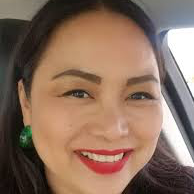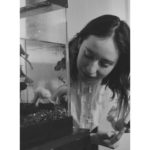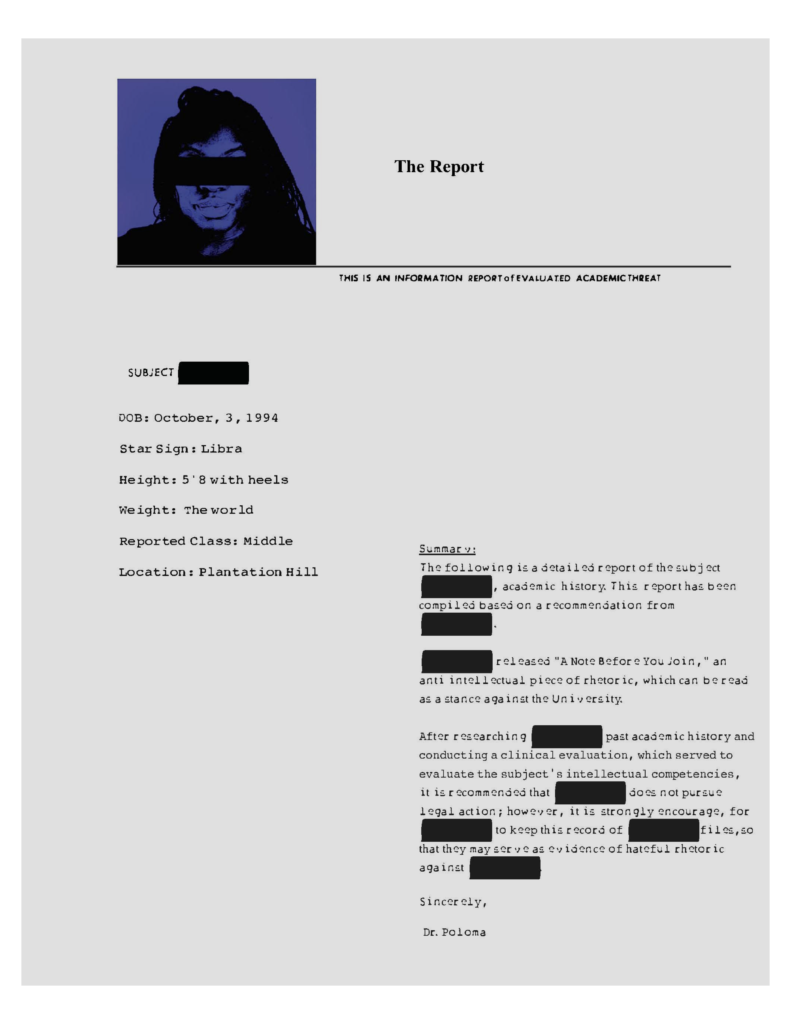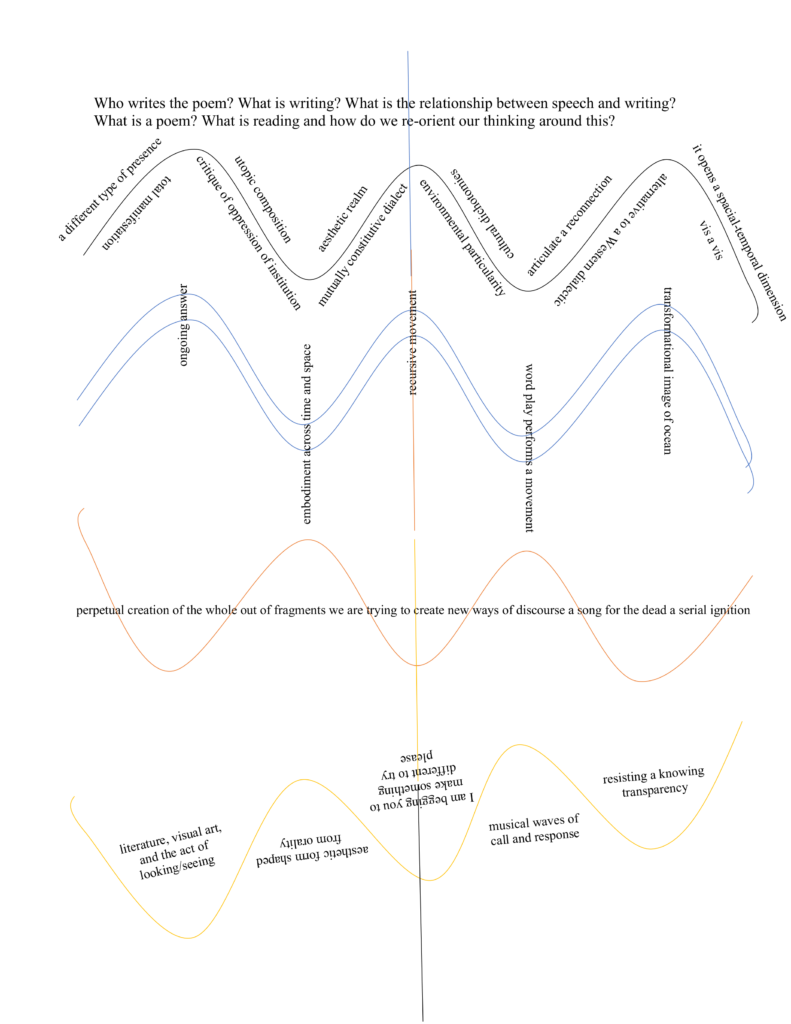Inadequate Vessels; or Simone White says, “A poem that doesn’t have its own mind frightens me.”
On February 27, 2020, writers/artists Tongo Eisen-Martin, Jaamil Olawale Kosoko, and Simone White, as commissioned by Dawn Lundy Martin, presented responses to my second collection of poems as part of an event for the Center for African American Poetry and Poetics at the University of Pittsburgh. At the event, titled “Reading Justin Phillip Reed,” I presented this response (in its original form) to the prospect of their responding. A video record of the event lives online. The quotes from Simone White were since added, along with some edits and, in particular, an expansion triggered by White’s reading.
Suddenly I feel compelled to consider the textures of virulence and possession. It’s winter and a novel cohort of upper-respiratory illnesses assails me from outside, but I swear there’s something pernicious living within my digestive tract. It stays with me no matter what I eat or don’t, what rail I half-grasp on the bus or what vapors I inhale in the university elevator. At night, my intestines twist and bloom as though in compact imitation of that one scene from Annihilation, and I am both accompanied and abandoned in the bedroom. If I whine like a dog kicked in the ribs, I let the pillow muffle it. I struggle to describe to others what I suspect is the same strain of pain that plagued Dan O’Bannon to conceive of xenomorph impregnation; his Crohn’s disease killed him. The doctors remain mystified. They prescribe me immune suppressants in flu season. They hand me over to lab tests. The way my body appears filters “pain” before it hits their ears; that is, they hear “discomfort.”
I play host to this mysterious science fiction while three differently ill artists enter my book before it can run and set about transforming it. It will, from this moment, never again be quite what it has been. There will be a weird little wriggle in that glisten of its cornea that wasn’t there before. Was it? Wasn’t? Wasn’t I too enamored to notice? I wrote the book I wanted while living in a city that I loved, in which, on most days, I knew gladness. We have left that place. Maybe my beloved always stayed awake all night, siphoning confidences from my lungs with fishing line, and watching me spring my nosebleeds. It’s better to know the book was never mine—or ours, my friends—but is its own chaos of transmission, like a skin. I came this evening prepared to receive its raw hell face, its basic brain, its vulnerability to light, and its saddest humanity.
How is infection like reading? It all happens so quickly. One day you wake up in the sunken place of a sickly creature, and your body despises your life. Yesterday, I believe, I began to hate the book.
“I hate this part,” says Jillian Armacost to her husband Spencer. “You’re still here but I know you’re going, and I hate that.” It’s the eve of Spencer’s mission. It’s the opening scene of the 1999 film The Astronaut’s Wife, starring Charlize Theron as the wife Jillian, Johnny Depp as the astronaut Spencer, and Joe Morton as the disgraced NASA rep and sacrificial negro Sherman Reese.
As happens to Charlize in The Devil’s Advocate, another husband with a random Southern accent uproots her into apocalyptic preparations. She has Rosemary Woodhouse’s haircut, and perhaps the film is desperately devoted to Rosemary’s Baby: there’s the latter’s witch surname “Marcato” hidden inside “Armacost,” and there’s John Cassavetes’s son as Alex Streck, the astronaut whose body couldn’t hack extraterrestrial possession. As Alex and Spencer attempt to repair a satellite, there’s an explosion. NASA loses contact with them for two minutes. Something else comes back to Earth’s surface dressed as Alex and Spencer. (Simone White says, “This was the conceit of Scooby-Doo.”) Alex dies of a massive stroke. “He’s hiding inside me,” Alex’s wife Natalie says to Jillian at the wake. Natalie takes a bath with a radio between her legs. Spencer relocates Jillian to New York City, where he becomes a corporate exec occupied with designing a war plane that will deploy radio waves like an EMP bomb.
Jillian’s drunk. She wants to know what happened to her husband for those two minutes he was both accompanied and abandoned in orbit. For pressing the subject, Spencer punishes her with rape and pregnancy, though the film stylizes his coercion to sound like seduction (the score deepens, her pulse grows audible, he speaks in husk) while the camera pans in curves. What invaded, violated, and occupied Spencer merely spiritually now conducts Spencer’s body to commit the act against Jillian in ways that mark the thresholds at which motherhood, distrust, social isolation, and physical abuse all enter. “Dark,” he says about the moment that changed everything:
Black.
No light.
No light.
It was black.
Silent.
No sound, but
but loud, something loud…
It was death.
This black death’s loud silence is something of the blood-taint anxiety riding these all-American couples to their ruin. It exploits their aspirations to empire. It replaces them in hegemony. It weaponizes their environments to disregard their suffering. It forces any fantasy of benevolence in their propagation to dissipate, clarifying their children’s membership in a globally destructive ascendancy. And it moves at first in an esoteric code that only Papa Pope is able to translate. It’s not just that Sherman Reese spends half the film behind the scenes, losing his job, his mind, and then his Blackass life in order to supply Jillian with a whole storage room of foundational evidence that Spencer is dead and she’s carrying the twin offspring of his killer. It’s also that, in the end, it doesn’t matter. Dude gives himself up to ash, knots, and jaundice just so Jillian can pivot and keep the kids and absorb the father. How much commendable, lamentable sweat, stress, and text erased for the sake of rabid replication, relieved from the omnipotence of nuance, overwritten by ravenous vacuity, complete absence of conscience. That shit is disrespectful and I want it, some times, want the levity of its immaturity. So, I wrote poems from the vantage of monsters who won’t be reasoned with, and who stampede into the oblivion of consequence. Until then,
“What’s happening” is frequently all that Jillian can say of her life. Along with the growth of the unknown within her, the unknowable city glowing chrome and gray outside her resurrects her mental illness. It is the specifically not-Black illness of visualizing herself and the people she knows dying violently; in her world, this is irregular and previously found her hospitalized. Meanwhile, her lover and only friend is corrupted by a being and language that utterly elude her. At dinner, the men make their mouths assemble phrases like “twenty-five thousand pounds of thrust,” “wingspan fully extended,” “a ceiling of fifty-five thousand feet,” “planes and tanks and computers and missiles all humming away,” “an electrical blizzard”—the hostile environment that their little fighter flies into. (Simone White says, “I’m currently enraged, in a way, by certain kinds of speech.”) The text of this, the plosive enunciations, accumulate a surface of force and cold calculation around Spencer.
How will Jillian survive this place. How introduce any creation into it. How to expect what once brought her support, pleasure, and adventure to ever again provide anything other than destruction, confinement, and fear. I mean to write something here about what is called a writing career, but who, at this moment, the fuck wants to hear it? Jillian’s thwarted abortion is not even loosely analogous to the writer’s reluctance to be personified by the well-received book. (Simone White says, “I’m thinking about why metaphor, which is common as dirt, makes me so mad.”) Whatever annoyance flanks the projection of lustrous production, however the honest-to-goodness interior flares its one-eighth-second Exorcistic demon’s visage, no matter how determined the cult of killing darlings: the violence does not cross the limen intact.
·
What is a poem’s own mind? The question fevers me, as it’s posed to do. Reese only appeared to be out of his mind to anyone unused to seeing. Jillian tried to distinguish the apparitions of her wrong mind, previously ill-met, from a wrong reality in which Spencer was not in his own mind at all. Simone White says something about Emerson but, maybe because my nerves are bad, I hear “Auden.” Not in the way someone is always hearing Auden if recently reading Auden, but still. Auden, who famously declared, “In so far as poetry, or any of the other arts, can be said to have an ulterior purpose, it is, by telling the truth, to disenchant and disintoxicate.” “Auden, however,” Seamus Heaney offers, “practiced more enchantment than this would suggest”—Simone White says, “You could call it ‘bewitching.’”—“so it is no wonder,” Heaney continues, “that [Auden] was impelled to keep the critical heckler alive in himself.”1 I’d like my inner critic to heckle as Jada Pinkett as Maureen, watching the film Stab inside the film Scream 2, saying, “if that was me, I would be outta there,” unaware that it’s too late for her to escape the theater / the film / the correlative kill scene. That meta-narrative flourish, which I find the most satisfying in the franchise, foregrounds a perpendicularity of consciousnesses—Maureen’s, fallible, soon to conclude, facing out of the film; the film’s, supreme and taking off, facing inward. Now, I want a formula for such a coordinate in order to, on some Turing shit, locate the moment at which the sovereignty of the text’s intelligence (let’s say it exists) attains animation. Perhaps it’d coincide the regular thanatoptic-erotic pangs legible in Simone White’s writing “what I meant when I referred to his prose exertions at the very start of this (long) essay,”2 or “I was trying to get off this page.”3 Perhaps not.
As for “any of the other arts”: if a thumb-through glam thriller motion picture like The Astronaut’s Wife can at least withstand interrogation as art—and in the film’s defense, it treats form as necessary illusion, its content is actively concerned with bewitchery, its dénouement is dependent on disenchantment, and therein it manages to tell truths (if we agree that capitalist aspiration can obliterate people from the insides out is a truth)—then I’m prepared to deal with what I read in this artwork, based on its overstated awareness of influence or shameless commitment to homage, as the rejection of its own (textual) mind. I’m thinking that this rejection could be central to the film’s raison d’être why the film is, in that its reiteration of a received narrative enacts simultaneous coverage of the problems of infection, influence, and transmission that preoccupy it in content and in the air around the container itself. This isn’t the awareness with which the hallmark of American sexual repression makes resurrecting Jason Voorhees always profitable, or even the post-meteoric, sophomoric depression in which Exorcist sequels were a motion that had to be gone through. Consider, rather, The Astronaut’s Wife as an exercise in patriarchal fatalism and, therefore, profuse capitulation to the anxiety that Pier Paolo Pasolini’s suggestion in the Sixties—“that, far from changing society, writers and filmmakers can do little more…than offer passive resistance to the irresistible tide of technological neocapitalism”4—would be no less potent in the arriving millennium. And it is more damning because Jillian is a schoolteacher. She marries another pilot. She sends her alien twins to school. She speaks in a voice that is ab-/new-normal: lower, certain, sexier in that way movies imagine possessed people sexy (read: dominant). She “achieves” individual purpose and familial companionship by falling victim to a diabolical inevitability.
On my way to the poem’s own mind, through the woods of the horror film imagery that influences my poetry in question, I meet a few granted presumptions I need to look in the eyes and name before passing on. First, that the film is analogous to the poem. Creators of adaptations of poems think so, certainly, in ways that better serve adaptations. But, to my mind, there are vectors, specifically illuminated by the horror genre, to be traced from myth through fairy tale through film script, or from myth through ritual through theatre through film, all of which are conveyed by language that is invested in the reorganization of conventional signifying—which tends to be ascribed to poetry. Carl Phillips has already related camera direction to more or less classical poetic structures.5 Pasolini, in Al lettore nuovo, asserted to his “new reader” that “a certain way of feeling something was identical” when comparing his film direction to his poems.6 The second presumption is that any artwork has its own mind at all. That it either (1) possesses some primordial or pure (as if alchemically precipitated) intelligence not merely emissary of the author’s own; or (2) computes, signals, or even dreams in the wake of stimuli received from other intelligences, and then, by summary of how we perceive its resultant performance, sufficiently represents to the skeptic an original thinking. (Simone White says, “I’m fuckin with you a little bit by performing a literary-critical explanation…”) Does an artwork appear to have its own mind simply when the audience cannot trace its hermeneutic nexus? Or when that trace cannot account for the artwork as received? In the first case, there’s a way Ari Astor’s Hereditary appears to have its own mind to people who don’t consider horror films in discourse with each other. And in the second case, arguably, there is Bill Gunn’s Ganja and Hess.
Art that doesn’t stop at abiding by its own natural laws, but that has no natural laws or has natural laws it doesn’t respect—the latter being, I suspect, the fullest exercise of compounding the intuitive logic and normalized magic that Kate Bernheimer traces as elemental components of fairy tales—I experience this sort of art as / in peril.7 I’ve found Disney’s Alice in Wonderland more deeply unsettling than any film classified horror. I sat agape and in sustained anxiety as masses of self-involved strangers relentlessly invaded the protagonist’s home in Aronofsky’s Mother!, but that’s because I have this problem called “home training” and don’t like people making messes in my space and not cleaning up—a problem that I worry inhibits me from inhabiting true lawlessness. But the prospect of the film or the poem effecting in me, the host, a disorganization more enduring than that in the artwork itself: this is what I find frightening, and attractive. I do not know how to teach poetry. I don’t know how poetry happens. I don’t know what possessed Gwendolyn Brooks to write “And I was hurt by cider in the air.” We never hear in Mother! the poet’s poem—which must be a poem to end all poems to elicit the response it does—because the film would have to define, by creating, the (impossible) ur-poem and would therefore die, totally and immediately.
Façade falls. Fourth wall with holes in it: a mounted portrait with roving eyes. I’m not sure I’m sorry my poems can’t be trusted. Not everything with its own mind is guilty of original thinking, or even interested. A person, for instance. Something must hide inside and bewilder. The grandmother suit bursting at the seams, the wolf gets away from itself in salivation, horniness: the scene is captivating. Perhaps the practice of the rejection of preciousness, which often eludes my good home training, allows Simone White, who is brilliant and does not fuck with my book, to infect and permanently fuck with how I experience those poems—poems that mean to participate, impossibly, in the simultaneous reproach and rejection of canon, and especially the canonicity of “good Blackness.” And what about such a book is too sacred to succumb to total and immediate revision?
I haven’t read as many books as Simone White, that’s obvious. I just try to be attentive to the intelligences of horror culture iconography that folks otherwise tend to deploy for cuteness or dismiss as cheap tricks. And I have watched a fuck-load of Scooby Doo, Where Are You?, the conceit of which doesn’t end in the mask-off refrain, doesn’t cease in the revelation that the monster is always a person. Scooby Doo villains are people who hide inside the inexplicable as straw men for underhanded exploits, cheating people who get inheritances out of their inheritances or thwarting the operations of wealth-hoarding institutions. The Mystery Machine team always cooperates with cops. Shaggy and Scooby always eat somebody’s groceries on the low. And, on their way to help send another masked man to prison, they break a lot of shit, slapstick. Mess for the hell of it really aggravates me.
1 Heaney, “Sounding Auden,” London Review of Books, Vol 9, No. 11 (June 4, 1987).
https://www.lrb.co.uk/the-paper/v09/n11/seamus-heaney/sounding-auden
2 White, Dear Angel of Death (Brooklyn: Ugly Duckling, 2019), p. 133. Italics mine.
3 Ibid., p. 89.
4 Naomi Greene, “Theory: Toward a Poetics of Cinema,” Pier Paolo Pasolini: Cinema as Heresy (Princeton Univ., 1990), p.93.
5 Phillips, “Little Gods of Making,” The Art of Daring (Minneapolis: Graywolf, 2014), p. 8.
6 Cited by Greene, “Under the Sign of Rimbaud,” p. 18.
7 Bernheimer, “Fairy Tale is Form, Form is Fairy Tale,” The Writer’s Notebook: Craft Essays from Tin House (New York: Tin House, 2009), 61-73. http://www.katebernheimer.com/images/Fairy%20Tale%20is%20Form.pdf
Justin Phillip Reed is an American poet, essayist, and amateur bass guitarist whose preoccupations include horror cinema, poetic form, morphological transgressions, and uses of the grotesque. He is the author of two poetry collections, The Malevolent Volume (2020) and Indecency (2018), both published by Coffee House Press. Born and raised in South Carolina, he participates in vague spirituality and alternative rock music cultures and enjoys smelling like outside.
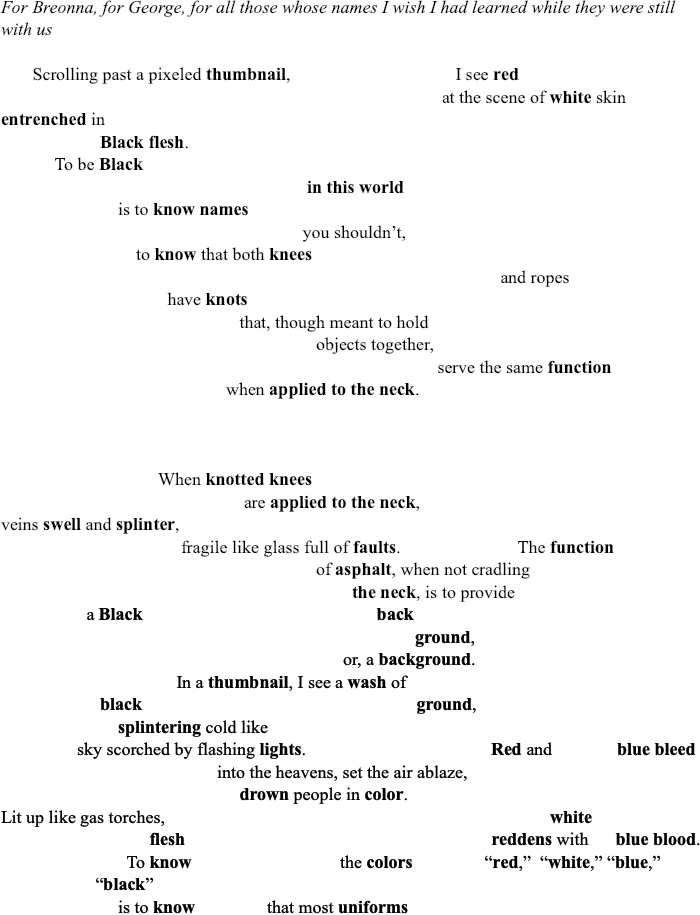

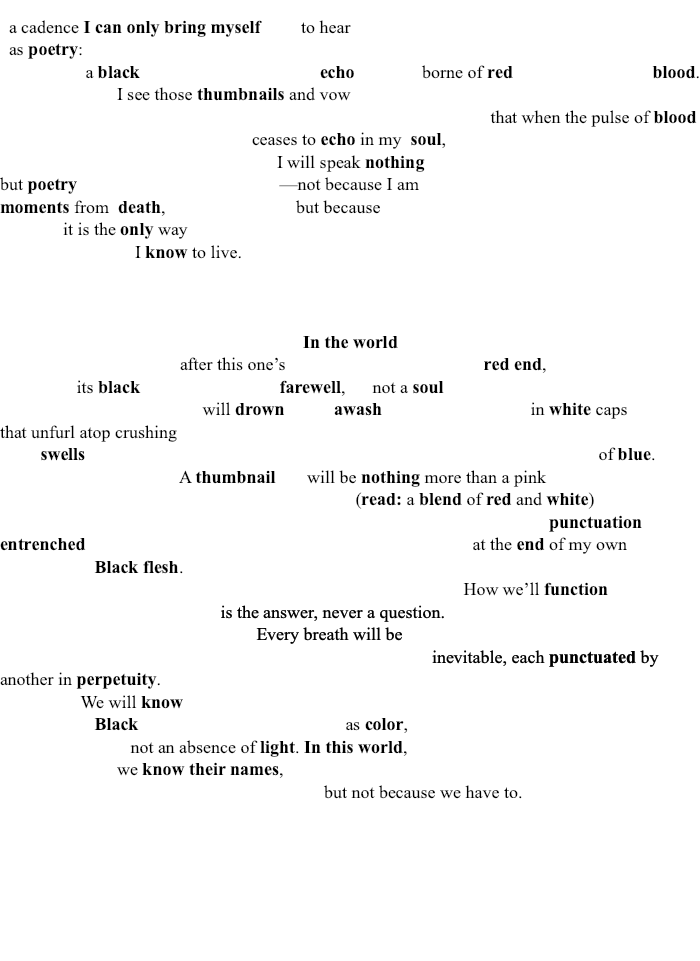
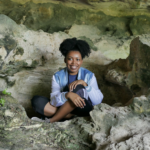

 BACK TO ISSUE
BACK TO ISSUE
